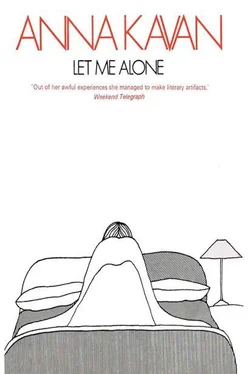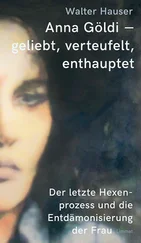They were a good deal together, in the end. Anna had assumed some of the lighter household tasks — making beds and so on — which she performed fairly efficiently. She preferred Winifred’s society to that of Matthew, who annoyed her exceedingly by his refusal to take any part in the turmoil of work. Matthew simply sat back, pasha like, to be waited upon. The meals might have appeared on the table by magic for all the notice he took of the elaborate labour which their preparation involved, which annoyed Anna very much.
‘Why don’t you make him do his share?’ she said to Winifred.
‘Oh — he’s a man.’ Winifred made a strange, disgusted grimace, as though to anathematize the whole male creation.
‘But you could make him do something,’ Anna persisted.
‘It’s no good. Men are so hopeless,’ said Winifred, fatalistic.
Anna was more annoyed than ever. She was most irritated by this conspiracy of the feminine Kavans to encourage the pasha-attitude in Matthew. Why shouldn’t he do his share of the work? And why was Winifred so resigned to her dreary, detested round?
‘If you hate living here so much, why don’t you go away?’ she asked her, frowning, irritably perplexed.
A dark, fixed look, lowering and grim, came on the sullen face of the other girl.
‘Where should I go to?’ she said, heavily.
‘Oh — somewhere — anywhere! What does it matter? The principal thing is to get away.’
‘Without any money?’
Winifred’s voice was heavy and cynical. She looked up, and Anna caught a gleam of ridicule in her eyes.
‘You could get some kind of work,’ she retorted, in impatiently acid tones.
But Winifred only stood there, heavy and glum, and stared back at Anna with the jeering light in her eyes.
‘You could get a job, couldn’t you?’ Anna’s lip was curling impatiently.
‘I’ve never been trained to do anything,’ came from Winifred.
The impatience covered Anna’s face like a shadow, her eyes set cold in contempt. Then quickly she turned away.
She couldn’t bear this fatalism in Winifred. This hopeless sort of laissez faire irritated her to distraction. Perhaps because she felt something of it in herself. Anyhow, she could never, never condone it; or even tolerate it. So there could never be any real friendship between them. Nonetheless, she rather liked the girl.
There was still a fortnight before the boat sailed. Anna existed entirely in anticipation. The present, River House, was quite without meaning. What the future would mean to her she did not stop to consider. At any rate, there would be the East, and sunshine, and the absence of dreary indoor drudgery.
After a chain of mild, grey days when the year seemed to hesitate reluctant, autumn sprang suddenly to midwinter. It grew bitterly cold, a dank, clammy mist hung about. It was so clinging, that mist, although impalpable: you could drive it off with your hands, almost. But always it was there, intangible and persistent, creeping into every cranny, and striking a chill to the very bones. The dismal kitchen, and the long stone corridors of River House were dungeon-like. The scullery was a vault.
The two girls scurried round the shops of a morning with their basket of vegetables and eggs and oddments of grocery.
Winifred seemed to wilt in the cold. It really got her down in some way. Under her shabby hat, her face was pinched and yellow-looking; her skin went blotchy round the mouth. She looked old. Like an old maid already, with her crabby expression and her dull, chapped skin that seemed to have suffered from too much cold water. And she grew crosser and crosser.
‘Do let me lend you a fur. Or a warmer coat,’ said Anna, seeing how Winifred shivered at the raw street corners in her old, thin jacket.
But Winifred only sneered at her, viciously, savagely, repulsing her, and setting a barrier between them.
‘Why? Are you ashamed to be seen out with me?’ she asked cuttingly.
What an impossible creature!
Half-a-dozen times in a day Anna decided to give her up, to abandon her to her fate. But in the end she was always driven to seek her out wherever she was, toiling and grubbing away like a housemaid in the chilly depths of the house: partly out of pity, and partly because she really preferred her caustic remarks to Mrs. Kavan’s flyaway sugariness or Matthew’s flat incomprehension.
‘What on earth made you marry Matthew?’ Winifred asked her suddenly one afternoon.
Lunch was recently over. They were in the scullery, washing the dirty plates. Winifred plunged each plate fiercely into the basin of greyish, greasy water, swilled it round, and deposited it with a jerk of loathing, upside-down on the draining-board. When Anna was to pick it up and dry it with a red-bordered cloth.
‘What on God’s earth induced you to do it?’
She watched Anna’s face go still, rather cold, as if retreating from the question, and from her.
‘Circumstances, I suppose,’ Anna replied coldly.
She resented the question, and the spiteful tone. But Winifred pursued it, spitefully, pressing her, her eyes black with malice like a malignant demon’s.
‘What you see in him I cannot imagine.’
Anna dried a plate in silence, and added it to the pile beside her.
‘Lucky for us that you do see something!’ Winifred cried, not to be put off.
‘Why do you say for us?”’
‘Because we shall all be able to sponge on you’ — she paused, and her face looked ugly and tired — ‘Matthew won’t be the only one to benefit, you may be sure’ — she stared vindictively — ‘we shall all come in for a few crumbs.’
Her voice sounded fierce. She was trying to sting Anna into retaliation, to force her out of her superiority.
‘What do you mean?’ said Anna, startled. ‘I’m sure there’s nothing much to be got out of me.’
‘What? Nothing much? There’s your money, isn’t there? Do you call that nothing much?’
Anna put down her drying-cloth, frowning a little.
‘But I’ve only my three hundred a year.’
‘Only three hundred!’ mocked Winifred, jerking her head impatiently. ‘Only! Only! That shows all you know about the value of money! You haven’t any conception what an extra three hundred a year means in a family like ours.’
She was still savagely jeering.
Anna looked her steadily in the face, with an expression cold, distant, and haughty. She looked at her sister-in-law as she might have looked at an Esquimaux, a creature vastly remote. And her cold grey eyes seemed to set her apart in scornful superiority. A chilly fastidiousness, like armour, divided her from the Kavans and all their works.
‘Do you mean that it influenced Matthew to know that I had a little money of my own? That otherwise he might not have wanted to marry me?’
‘Of course it influenced him. It’s very important to him. Because we have so little. He couldn’t afford to support a wife’ — Winifred sneered fierce like a demon.
‘So he thought I might be a financial asset to the family,’ said Anna, cold as stone.
‘Ask him!’ said Winifred vindictively.
There was a note of triumph in her voice, but also a sort of wistfulness. In her anger, and her spiteful ugliness, she was rather pathetic. Anna looked at her and went to the door.
‘Yes. I will ask him,’ she said, a cold contempt coming into her tones. She let Winifred see that she found her contemptible and repellant; especially contemptible.
Matthew was sitting in the drawing-room. His mother stooped over the fire, putting on more coal.
‘I want to speak to you, Matthew,’ Anna said coolly.
‘What about? Is it important?’ He sounded surprised. The stupid smile was on his face.
‘It’s a matter that only concerns the two of us.’
Читать дальше












